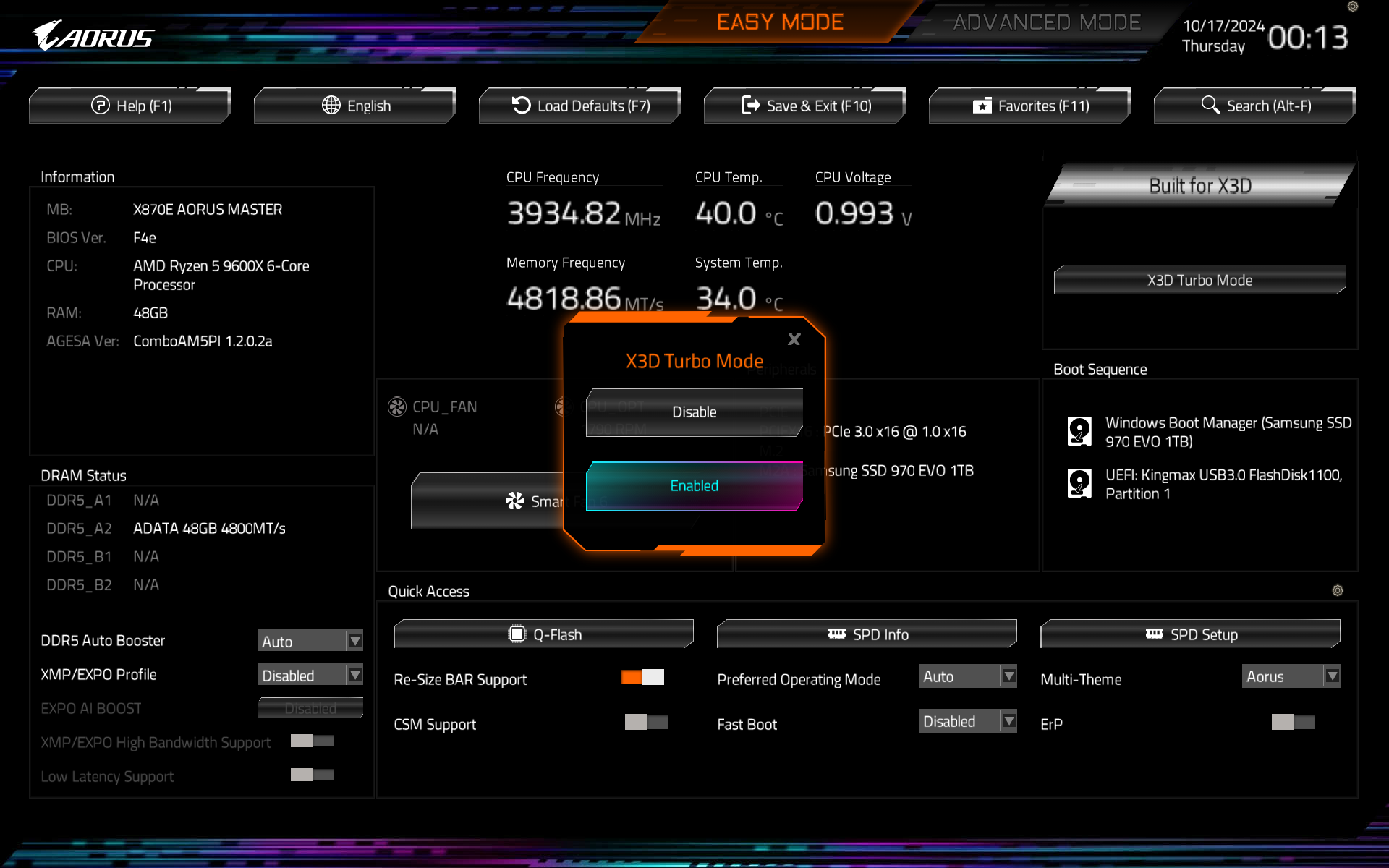A ‘revolutionary’ Turbo Mode promises up to 35% faster gaming on Ryzen chips
Gigabyte's new X3D Turbo Mode is said to deliver between 20% and 35% better gaming on the Ryzen 9000 chips.


Ryzen 9000 hasn’t been the surefire hit AMD fans were hoping for. Enthusiasts are still waiting for the X3D chip in the line, but Gigabyte has already announced a new X3D Turbo Mode for its motherboards that supposedly delivers between 20% and 35% better gaming performance.
Gigabyte calls it a “revolutionary BIOS feature” that’s designed to improve performance for X870E, X870, and 600 series motherboards that can boost the Ryzen 7000X3D and Ryzen 9000 series processors.
Perhaps the most fascinating nugget from Gigabyte’s press release is mention of an “incoming Ryzen 9000 X3D” processor, which will receive the largest performance benefit of up to 35% and is already being anticipated to be among the best processors you’ll be able to buy when it eventually launches. The non-X3D Ryzen 9000 chips will get a lower 20% performance boost. Gigabyte notes that the X3D Turbo Mode ups the Ryzen 9000 chips to “achieve similar gaming performance levels as their Ryzen X3D counterparts.”

Gigabyte didn’t, however, mention the exact performance boost that would be offered to the Ryzen 7000X3D processors. As Tom’s Hardware notes, Gigabyte also doesn’t explain how exactly its new Turbo Mode works, instead referring to it as “wizardry.”
The promise of the faster performance is enticing, though, and hopefully improves the value of AMD’s Ryzen 9000 chips. AMD itself offered a 17% boost to performance on these processors a couple of months after their launch, and Gigabyte’s Turbo Mode could enhance performance even more. More than anything, confirmation of the “incoming” Ryzen 9000X3D chips was enough to get my attention.
Gigabyte says the X3D Turbo Mode is available in the latest beta BIOS release now, so you can go check out the performance gains for yourself.
Luke Larsen is the Senior Editor of Computing, managing all content covering laptops, monitors, PC hardware, Macs, and more.
Intel’s instability update cuts speed by up to 6.5% — but don’t panic yet
Intel has finally gotten a grip on its disastrous instability problems that have been the bane of some of Intel's best processors for nearly a year, including the Core i9-13900K and Core i9-14900K. The update was released last week, and users are now taking it out for a spin. And unfortunately, some are reporting performance drops of up to 6.5%.
A user on the Chiphell forums tested the new BIOS patch that is supposed to address instability on Intel's 13th-gen and 14th-gen CPUs. The user twfox saw a drop of around 6.5% with the Core i9-13900K in Cinebench R15's single-core test, at least compared against Wccftech's own tests. In the more recent Cinebench R23, the Core i9-14900K dropped about 2% of its multi-core score, falling behind AMD's Ryzen 9 7950X.
AMD’s Ryzen 7 9800X3D might show up sooner than expected
AMD might be moving on 3D V-Cache versions of its Ryzen 9000 CPUs faster than expected. According to a leaker on the Chiphell forums, the Ryzen 7 9800X3D, which could be among the best processors when it releases, might arrive as soon as next month.
VideoCardz dug up the news, which started on the Chiphell forums. The leaker goes by the name zhangzhonhao, but VideoCardz notes that they went under a different alias previously, and that they have a long history of leaking company road maps. The forum post claims AMD will release the Ryzen 7 9800X3D at the end of October, while the Ryzen 9 9900X3D and Ryzen 9 9950X3D will arrive later. The leaker suspects they'll show up in early 2025 with "some new features."
Intel almost designed the chip for the PlayStation 6
AMD has been at the heart of Sony's consoles for the last two generations, but a new report suggests Intel was close to designing the chip inside the unannounced PlayStation 6. Intel and AMD were caught up in a bidding war to design and manufacture the chip for the console, but Intel ultimately lost out on the contract, reports Reuters.
According to the report, negotiations with Intel fell apart over how much profit the company would earn from each chip it sold to Sony. Sources who spoke with Reuters say that these discussions took place over several months in 2022 and included the CEOs from both Intel and AMD, as well as "dozens of engineers and executives."

 Tekef
Tekef 




























.jpg)








